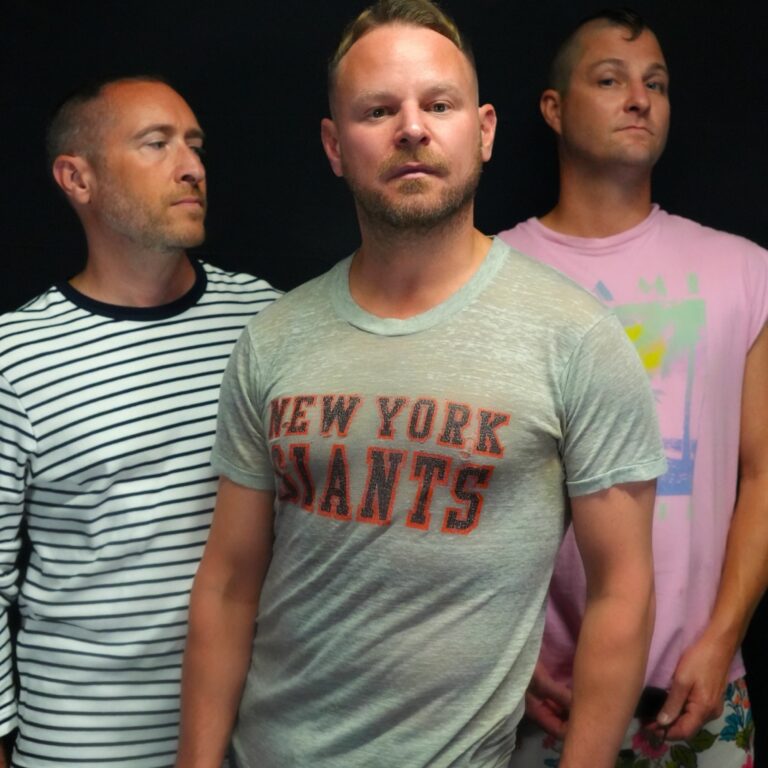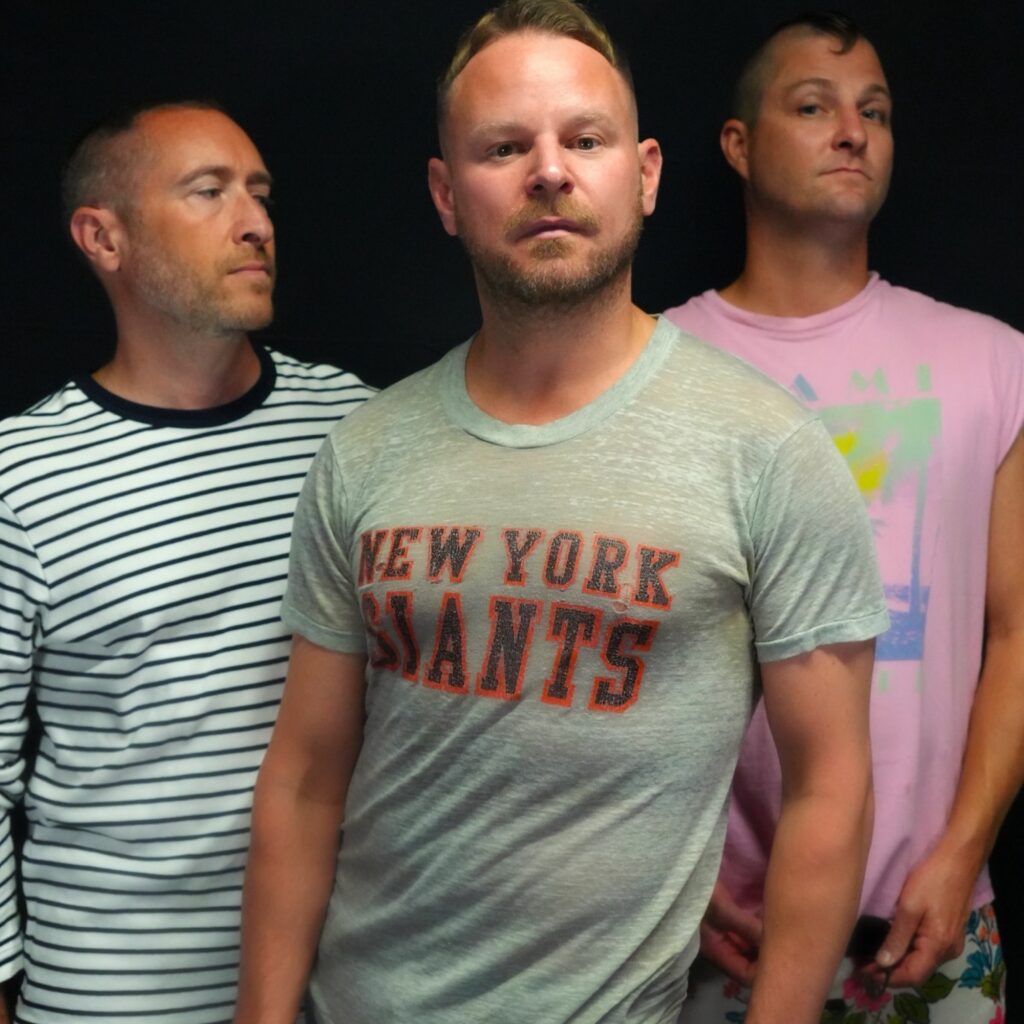AudioFuzz Exclusive Interview: The Dead Betties Reclaim Rage and Truth with Whitey
For over two decades, The Dead Betties have been a fearless force in queer punk — a band that never traded rebellion for comfort, or truth for palatability. Their upcoming Whitey EP (out November 21 via Rotten Princess Records) finds the NYC trio — Joshua Ackley, Eric Shepherd, and Derek Pippin — more unapologetically themselves than ever.
Led by the searing single “What’s A Good Victim Supposed To Say?”, Ackley confronts his own experience as a survivor of rape, shattering society’s sanitized expectations of victimhood. The result is a body of work that’s raw, political, and deeply personal — a howl against complacency in an age obsessed with performative authenticity.
Across Whitey, The Dead Betties fuse fury with precision, layering distorted guitars and jagged emotion into songs that refuse easy redemption. It’s an unfiltered record about survival, rebellion, and reclaiming identity in a culture that too often demands silence.
In this exclusive AudioFuzz interview, frontman Joshua Ackley opens up about turning trauma into protest, rejecting the “cult of positivity,” the state of queer punk in 2025, and why Whitey is the band’s most fearless release yet.
Q: “What’s A Good Victim Supposed To Say?” is both deeply personal and politically charged. When you decided to write about your own experience as a survivor, did you approach it more as an act of catharsis, confrontation, or rebellion against how society defines victimhood?
A: It’s rebellion, first and foremost — rebellion against how we’ve been taught to think about victims. Writing it was emotional, of course, but it wasn’t about exorcising my own pain as much as exposing how narrow and cruel the world can be toward anyone who’s survived something. We don’t really have space for survivors to exist honestly. You’re expected to perform healing — to fit into one of a few neat storylines people understand.
When I finally sat down to write about my assault, it wasn’t because I was “ready” in the therapeutic sense. It was because the person who hurt me had died, and something shifted in me. Suddenly, I could look at the experience without flinching, almost like I was studying a cultural artifact. What hit me hardest was how much of that pain was shaped not just by the trauma itself, but by what comes afterward — the disbelief, the rules, the social choreography around how you’re supposed to talk about it.
The song became a rebellion against that choreography. I wanted to call out the absurdity of a world that shames you for naming what happened, and then also shames you for being angry about it. We’ve turned “victim” into a dirty word — like acknowledging harm somehow makes you weak. And that’s the exact lie I wanted to burn down.
So yes, there’s catharsis in it, but it’s not quiet or polite. It’s the kind of catharsis that feels like smashing a mirror and finally seeing yourself clearly in the shards.
Q: You’ve talked about the “cult of positivity” and how it can silence real healing. How did that idea shape the emotional tone and production choices on the Whitey EP?
A: I hope anyone who listens to Whitey can feel that we didn’t force a positive narrative onto dark material. We didn’t want to reframe pain as inspiration or package anger as redemption. There’s nothing saccharine about this record. Even the most playful moment — our cover of Liz Phair’s “Girls! Girls! Girls!” — isn’t a “positive” song in the feel-good sense. It’s empowering, yes, but it’s rooted in rebellion. It’s about refusing the role society assigns you and reclaiming your own power.
That idea guided the entire creative process. Every element — the lyrics, the performances, the production — moves in one direction, toward confrontation. We wanted the dissonance of the guitars to stay jagged and unpolished, especially on the title track Whitey and on “What’s a Good Victim Supposed to Say?” That dissonance mirrors the moment we’re living in. The world feels noisy, unstable, unresolved — and we wanted the music to sound like that, too.
We’re in a cultural space defined by tension. People are angry, scared, waking up, but still being told to smile through it — to manifest harder, to find silver linings in systems that are collapsing. Whitey pushes back against that. It’s not about optimism; it’s about truth. If that truth wakes people up or shakes them out of complacency, that’s the kind of “positive” I can get behind.
Q: The Dead Betties have been fighting bigotry since your early days—literally facing neo-Nazis at shows. Two decades later, how do you see the landscape for queer punk evolving, and what does “angry queer music” mean in 2025?
A: We’ve definitely faced our share of bigotry — neo-Nazis, homophobes, and other general idiots. Two decades later, I wish I could say the landscape has evolved, but honestly, it hasn’t. If anything, it’s flattened. What passes for “edgy” now sounds like it was produced by Disney. Everything has the same glossy sheen — even the so-called dark or rebellious stuff. When a band’s press release says, “This is our bold, dangerous new record,” and it still sounds like a Target commercial, that’s when you know we’re in trouble.
The industry has become allergic to real risk. There’s almost no outsider art breaking through the mainstream anymore, and that’s a cultural crisis. Everyone’s so busy trying to be marketable, to make songs that fit into fifteen-second clips, that we’ve forgotten how to make statements. Artists have traded rebellion for branding. And what’s worse, people have started confusing those two things.
So yeah, I’m angry — but I think that anger is necessary. Whitey is a reaction to that complacency. The Dead Betties have always refused to play the content game. We rejected MySpace, we reject social media now, and we reject the idea that art should be optimized for the algorithm. We don’t need to dance for fifteen seconds to prove our relevance.
Angry queer music in 2025 shouldn’t sound like a product — it should sound like a protest. And until it does, we’re going to keep making noise.
Q: Kathleen Hanna called Whitey “if Sonic Youth started a poppy hardcore band in 1989.” How do you feel about that comparison, and what sonic or emotional risks did you take on this record that set it apart from anything you’ve done before?
A: First off, deep gratitude to Kathleen Hanna — not just for listening to Whitey, but for everything she’s done for art, rebellion, and equality. She’s a singular human being, and that singularity is what makes her extraordinary. For someone like her to take time out of her day to actually review our EP? I can’t even express what that means. And honestly, “if Sonic Youth started a poppy hardcore band in 1989” might be the best review we’ve ever gotten.
We’re total nerds about Sonic Youth — I’ll go on record and say they’re the most important rock band of all time. So to even be mentioned in the same sentence is jaw-dropping. But what’s especially validating is that Whitey is the first record that truly sounds like us. For years, we worked with a rotating cast of producers — some we chose, some we didn’t — and it was always a compromise. There’s always that one person unhappy, or all three of us slightly dissatisfied, but you release it and move on.
This time we didn’t compromise. We built our own studio, got our own gear, and learned how to engineer the sound ourselves. Whitey is the first product of that freedom — the first time we’ve had full control over how we sound. That means we could push everything further: louder, rougher, more dissonant, more honest. We could take every sonic risk we wanted because there was no one telling us no.
And the emotional risks are even greater. This is the first record where I’ve stripped away all metaphor and distance. I’ve always written through allegory — through storytelling — as a kind of armor. Whitey doesn’t have that armor. Songs like “What’s a Good Victim Supposed to Say?” and “Game Over” are pure bloodletting. They’re direct, unfiltered, and raw in a way I’ve never allowed before.
So when Kathleen compares us to Sonic Youth with pop instincts, that feels right. It’s the first time the chaos and the melody — the rage and the vulnerability — finally live in the same room together. Whitey is the record where we stopped protecting ourselves and just told the truth.
Check out their latest single below:


